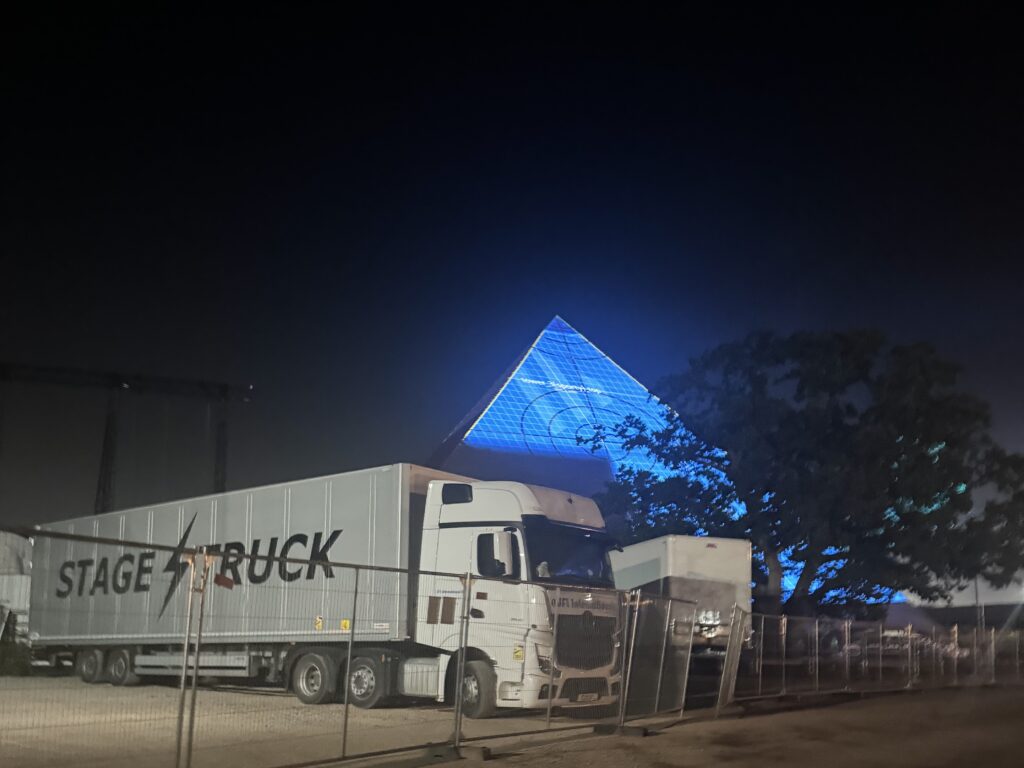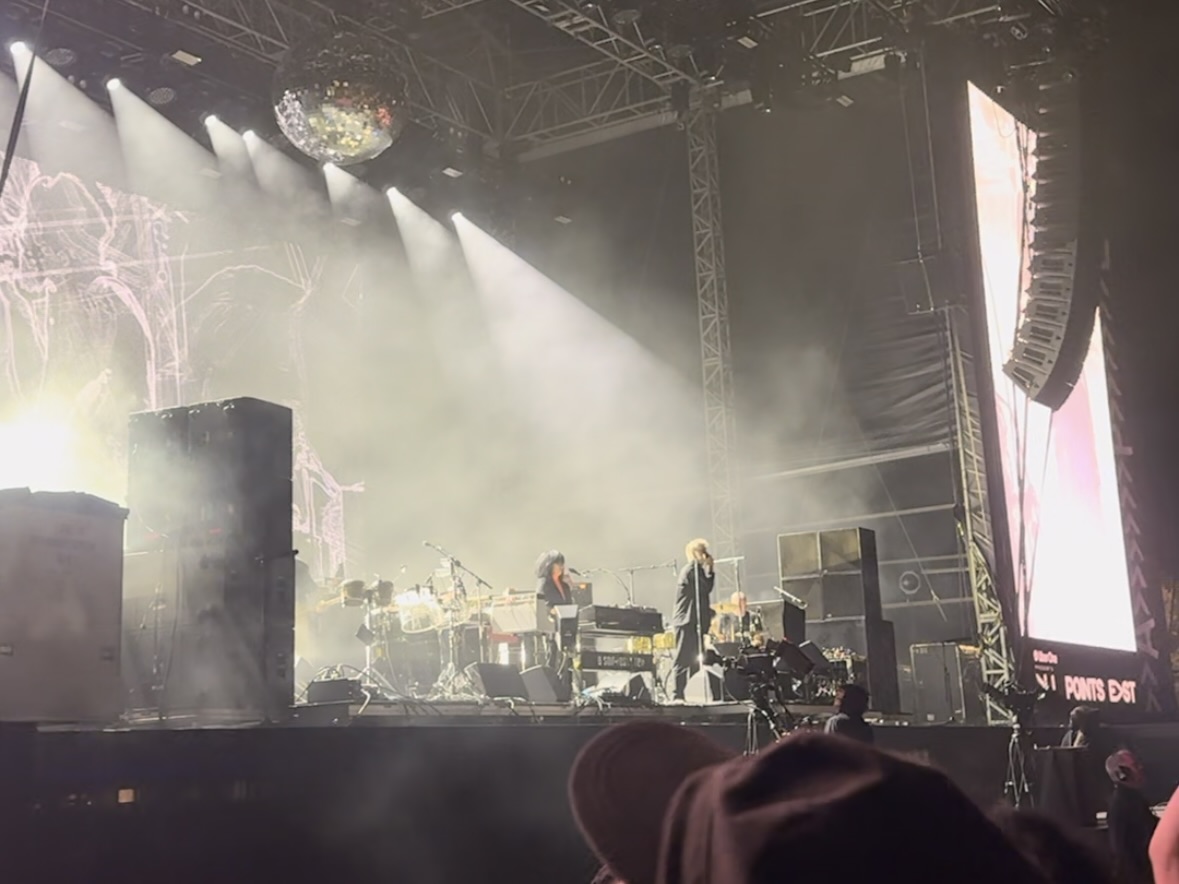In the world of live events, where electrifying performances take centre stage, the unsung heroes are often those operating behind the scenes. Iain Lane, site and yard coordinator for Buffalo Power Services, is one such figure. Based out of Washington, Sunderland, Buffalo specialises in providing temporary power solutions for festivals and large-scale events. We spoke to Lane about his recent work at TRNSMT festival and tour with Ed Sheeran. In the changing landscape of post-pandemic entertainment, the world of temporary power solutions is an ever-evolving industry juggling a multitude of issues, unseen by the average crowd member.
From Kendrick Lamar to Beyoncé, Buffalo’s team handles events that require a lot of power often in places where “you can’t just tap from the grid,” Lane explains. Speaking over zoom while currently out on tour with Ed Sheeran in Belgrade, Serbia, Lane laughs while telling us he specialises in “making a city out of a field,” referring to his work on greenfield festivals.
The preparation for events of such scale is a meticulous process that starts months in advance. “Planning [for the summer ahead] normally begins around about December-January”. During this period, the company are provided with a preliminary site plan. The site is then examined in person to assess how work will take place. Factors such as hill inclines and tree canopies can all make the difference in how long a job will take. Something your average festival camper doesn’t consider while hauling their tent up to the campsite.
A single day can cause a huge impact for Buffalo, as their schedule has only grown tighter post COVID-19 pandemic. “Everybody’s having a little go [at festivals]” Lane exclaims, “it’s like a bit of a feeding frenzy around these new events.”
However, a report shared by the Association of Independent Festivals (AIF) shows many of these smaller new festivals may lack the long-term sustainability needed to survive year after year. The report looked at UK festivals with capacities ranging from 500 to 80,000 and has revealed in 2024 alone, 40 festivals announce cancellation, postponement, or closure. Due to this figure, the AIF have recent petitioned the Government to lower VAT on music festival ticket sales. We reached out to the AIF over their Five Percent For Festivals campaign, however received no response.

Despite the challenges of rising operational costs due to inflation, Lane doesn’t see the cost-of-living crisis affecting the demand for large established festivals. In fact, he predicts the opposite. “Often you find, festivals and events do well,” explains Lane, “where people would normally go to Benidorm for a week, or they would go to Crete with their mates for a couple of nights or whatever, they’re priced out of that a bit now, so they’ll go, “f*** it we’ll go TRNSMT Festival instead”.”
“Before it was always the case of just trust,” Lane sighs while grabbing a large folder as evidence, “[but now] I keep every fuel slip from every fuel delivery”. He explains how now, for a lot of the smaller organisers, the margins have become tighter and the cost of 6 people working instead of 8 can be the difference between them making a profit and loss.
“Everything has a knock-on effect, doesn’t it?” Lane concludes. While pondering upon the Ukraine/Russia conflict, he states how “we used to pay, about, 50/60 pence a litre … and now we’re paying well over double that.”
“we used to pay, about, 50/60 pence a litre … and now we’re paying well over double that.”
Iain Lane
With sustainability being a major focus for the industry recently, Lane is quick to point out the complexities behind the trend. When it comes to how much attention is given to the issue is “promoter specific,” Lane says. Larger companies like Live Nation and Festival Republic want their events to be as sustainable as possible and as they own a vast portion of smaller promoters, a lot of attention is spent on the sustainability issue.
“We can only use certain lights, we can only use certain fuel. We use HVO (hydrogenated vegetable oil) instead of diesel now”. Although costing more, it is a sacrifice many promoters are willing to make. Lane tells us how many of these promoters want proof their efforts are succeeding leading to Lane spending “more of my time now when I’m out of the office, not actually wiring things up, but actually using telemetry on the generators to say, this is why we use this size generator and not this size generator”.
Though, Lane observes how efforts to appear sustainable can lead to “greenwashing”, a term used when describing where the sustainable narrative doesn’t necessarily align with the actual environmental impact. For example, “Coldplay, at the minute, are leading the market for trying to pretend to people that they’re the most sustainable band in the world, when they fly around in a private jet.” Although praising their ideas of using bicycles and kinetic dancefloors to help power their tour, they don’t work as well as advertised, “it’ll power a phone for five minutes!” Lane notes, while being a good concept, it doesn’t negate the fact “you’ve got 50 trucks in the truck park to take your production out with 5.5l engines that run for 48 hours”.
Lane sees the future of Buffalo Power Services tied closely to the evolution of renewable energy . “Five years ago, [renewable energy] really wasn’t there, at the minute it’s getting there, it’s getting better and better”. However, the industry is still far from being able to power a full stage solely through renewables, “You’re never going to power a stage for a band in front of 80,000 people off solar or battery entirely, it will need to be generated at some point” Lane articulates.
As festivals are highly seasonal a lot of planning for the future of the company is carried out during the winter months. Everything used in the summer is tested and maintained, “we break a lot of stuff!” Lane says with a laugh. During this period a lot of time for buffalo is spent in rehearsal spaces, notably LH2 in London, where this winter two months were spent with Take That planning the most sustainable way to carry out their future shows.
Despite the long hours and logistical headaches, Lane remains passionate about his work. The blend of problem-solving, the changing environment, and the satisfaction of seeing a festival come to life make it all worthwhile. “Every single one is a challenge, that’s why I love this job! Nothing’s ever easy!” he with a smile. In an industry where the show must always go on, Lane and his team are the ones making sure it does.


